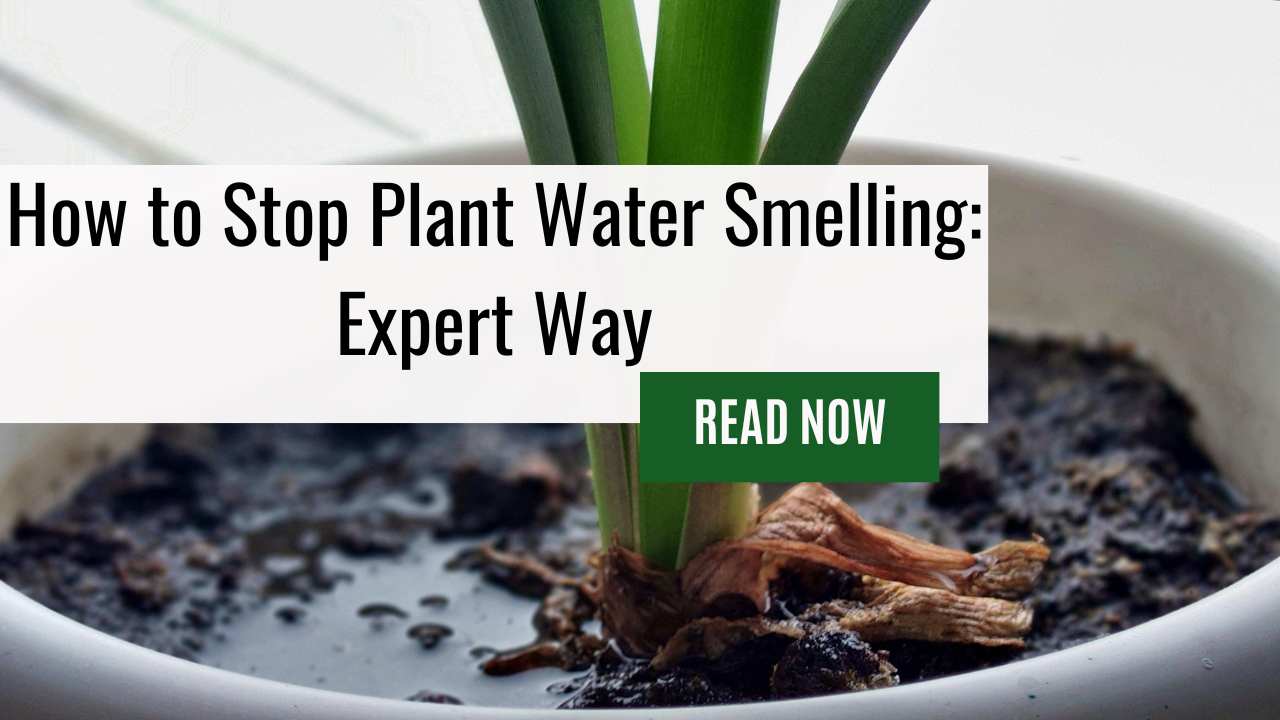Have you ever walked into a room and been hit with an unpleasant odor coming from your houseplants?
The smell of stagnant water can be both embarrassing and frustrating, especially if you’re proud of the lush greenery in your home.
Luckily, there are several ways to stop plant water from smelling so that you can enjoy your indoor garden without any unwanted odors.
In this article, we’ll explore some simple strategies for preventing foul smells emanating from your plants’ water supply.
Whether you’re dealing with stagnant water or just want to keep things fresh and clean, these tips will help you maintain a healthy environment for your beloved flora.
Get ready to take control of your indoor gardening game and say goodbye to smelly plant water once and for all!
Understanding The Causes Of Water Smell Like Rotten Eggs – Root Rot!
Have you ever walked into your indoor garden and been hit with a pungent odor that smells like rotten eggs? This unpleasant smell is often caused by stagnant water in your plant’s container.
Plants use water for growth, but when the water sits still without proper drainage, it becomes a breeding ground for bacteria and fungi.
These microorganisms emit gasses that mix with the water to create an unpleasant odor that can make anyone feel nauseous.
Another cause of smelly plant water is root rot. When plants are overwatered or receive too much hydroponic water, their roots become saturated and begin to die off.
As they decompose, they add organic matter to the water which fuels the growth of harmful bacteria and fungi.
If left untreated, this environment will only get worse, leading to sickly plants that struggle to grow properly.
To combat these issues effectively, it is essential to understand how frequently you should be changing your plant’s water.
Changing The Water Frequently to Remove the Smell of Hydroponic Water
Now let’s move on to some practical solutions.
One easy way to prevent a rotten egg smell or other unpleasant odors from developing in your hydroponic water is simply to change it frequently.
Overwatering can cause root rot and lead to stagnant water, which creates an environment for bacteria to thrive. To avoid this, aim to change your plant’s water at least once a week.
Even if you’re not overwatering, changing the water regularly will help keep it fresh and oxygenated. You can also add an air stone or bubbler to increase oxygenation and promote healthy roots.
When changing the water, be sure to rinse out your container thoroughly with hot water before refilling it with filtered or distilled water. Using filtered water can reduce the number of minerals and chemicals present in tap water that may contribute to foul smells in your hydroponic system.
Using Filtered Water – A Significant Part of How to Stop Plant Water Smelling
Water is an essential element for plant growth, but if not treated properly, it can lead to a pungent smell.
To prevent the unpleasant odor caused by buildup of organic material in the water or root rot in hydroponic water, using filtered water is recommended.
Filtered water is free from impurities and contaminants that could potentially cause harm to your plants.
When used, there is less risk of developing a foul odor as the filtration process removes particles responsible for causing smells.
Also, sterilization methods like boiling or adding chlorine to the water before use can help eliminate any remaining bacteria that may contribute to odors.
By incorporating these practices into your routine, you can ensure that your plants are getting clean and fresh water without any unwanted smells.
Furthermore, another technique to consider when eliminating plant odors is adding charcoal to the soil.
Charcoal acts as a natural filter and helps absorb any bad odor-causing substances that might be present in the soil.
Besides its deodorizing properties, charcoal also provides many benefits such as improving soil drainage and increasing nutrient retention capacity.
With proper care techniques like using filtered water and adding charcoal to the soil, you can have healthy plants with no bad smells while enjoying their beauty!
Adding Charcoal To The Soil
Are you tired of dealing with that unpleasant smell coming from your plant pot?
Perhaps you’ve noticed a rotten egg smell or just an overall musty odor. This could be due to root rot caused by excess water in the soil.
Fortunately, there’s an easy fix that can help eliminate this issue – adding charcoal to the soil. Charcoal is known for its ability to absorb impurities and odors, making it an effective solution for reducing any unpleasant smells emanating from your plant pot.
Simply mix some charcoal into the soil before planting or sprinkle some on top of the soil surface.
The charcoal will not only help combat bad odors but also improve drainage and aeration, which are critical factors for healthy plant growth.
So next time you’re repotting or watering your plants, consider incorporating some charcoal into the mix to keep that pesky water smell at bay.
But what if the water smell persists even after adding charcoal?
In our next section, we’ll explore another simple yet effective method using hydrogen peroxide to tackle stubborn odors and prevent further issues like fungal growth in your plant pot.
Using Hydrogen Peroxide
If you’re looking for a solution to stop that unpleasant water smell in your plants, then hydrogen peroxide might be the answer.
Hydrogen peroxide is a powerful oxidizer that can effectively get rid of bad odors and sterilize whatever it comes into contact with.
To use hydrogen peroxide, mix one part 3% hydrogen peroxide with three parts water and pour it over the soil.
This will help eliminate any rotten egg smell caused by root rot or other bacterial growths in the soil.
The mixture will also disinfect the plant roots and prevent the further development of harmful bacteria.
Make sure not to overwater your plants as this could lead to more problems down the line.
With regular application of hydrogen peroxide, your plants should start smelling fresh and healthy again in no time.
While using hydrogen peroxide is an effective way to combat plant water smells, another option you may consider is adding essential oils to the water.
Adding Essential Oils To The Hydroponic System
If you’re using hydroponic water or any other type of plant watering system, it’s not uncommon for the water to develop a foul odor. This smell is often described as rotten eggs and can be quite unpleasant.
Fortunately, there’s an easy solution for this problem: adding essential oils to your water.
Essential oils are natural extracts from plants that have strong fragrances, making them perfect for masking unpleasant odors.
Simply add a few drops of your favorite essential oil to your water reservoir, and your plants will enjoy a pleasant scent while also preventing the growth of bacteria that causes the rotten smell.
Some popular options include lavender, peppermint, eucalyptus, and lemon essential oils.
Not only will this method help with odor control, but it may also provide additional benefits such as repelling pests and improving overall plant health.
Give it a try and see how much of a difference it makes in keeping your plant environment fresh and clean smelling!
As effective as essential oils can be in controlling unpleasant smells in plant waters, they might not work all the time.
If you find that adding essential oils does not fix the issue completely, another option would be to try vinegar or baking soda instead.
These household items are known for their deodorizing properties and can effectively neutralize even the most stubborn odors.
In the next section, we’ll explore how these two common kitchen ingredients can help keep your plant’s water smelling fresh and free from any unwanted scents.
Using Vinegar Or Baking Soda
Did you know that the unpleasant smell coming from your plant’s water is caused by bacteria?
According to a study conducted by the University of Florida, stagnant hydroponic water can produce an odor similar to rotten eggs.
This not only affects the overall ambiance of your home or garden but also indicates poor hygiene practices.
To remove the foul odor and ensure healthy growth for your plants, you need to address the root cause – bacteria buildup.
One way to do this is by ensuring proper drainage.
Overwatering can lead to standing water in pots, providing a breeding ground for microorganisms that produce the nasty smell.
Therefore, make sure there are enough holes at the bottom of your containers and use well-draining soils to prevent excess moisture retention.
Ensuring Proper Drainage
Proper drainage is key to preventing your indoor plant’s water from smelling like rotten eggs.
When a plant is overwatered, the excess moisture can’t escape and begins to stagnate in the soil. The stagnant water then becomes anaerobic, causing it to emit an unpleasant odor.
To avoid this issue, make sure your plant has proper drainage holes in its pot. Without them, the excess water won’t have anywhere to go and will remain trapped in the pot with the roots of the plant.
If you notice that your plant’s soil is becoming too moist or smells bad, try adjusting how often you water it.
It may be necessary to let the soil dry out more between watering sessions or switch to a different type of hydroponic water that doesn’t contain any added nutrients.
By ensuring proper drainage, you’ll not only prevent unpleasant odors but also promote healthy growth for your beloved houseplants.
Now that we’ve covered how important adequate drainage is for maintaining healthy plants let’s move on to another crucial aspect of indoor gardening: avoiding overwatering.
Avoiding Overwatering
Now that we’ve discussed the importance of proper drainage, let’s move on to another issue that can cause unpleasant odors in plant water – overwatering.
Overwatering can lead to root rot, which not only smells like rotten eggs but also damages your plants’ health.
One way to avoid overwatering is by checking the drainage holes in your plant pot regularly.
If the holes are clogged with soil or debris, it can prevent excess water from draining out properly and create a breeding ground for bacteria.
To fix this, gently remove any blockages and ensure that the holes are clear before watering your plants again.
Additionally, consider using hydroponic water or adding perlite to improve drainage and reduce moisture retention in the soil.
By taking these simple steps, you’ll be able to prevent foul-smelling plant water and promote healthier growth for your beloved greenery.
To maintain a fresh scent in your plant water, cleaning the pot regularly is essential. This will help eliminate any buildup of dirt, bacteria, or algae that could contribute to bad odors.
In the next section, we’ll go over some easy tips and tricks for keeping your pots clean and odor-free so you can enjoy happy and healthy plants all year round!
Cleaning The Pot Regularly
One of the most common reasons why plant water smells rotten is due to a dirty plant pot. Over time, dirt and grime can accumulate in your plant’s container, which can mix with the water and create an unpleasant odor.
To avoid this issue, it’s crucial to clean everything regularly. To start cleaning your plant pot, you need to remove any dead leaves or debris that may be inside.
Once you’ve done that, rinse the pot thoroughly with warm water and soap.
Make sure to scrub every nook and cranny of the container until all traces of dirt are gone. Afterward, dry it off completely before adding new soil and your plant back in place.
By doing so regularly, not only will you prevent bad odors from forming but also ensure your plants remain healthy for longer periods!
Next up: Removing Dead Leaves and Debris…
Removing Dead Leaves And Debris
Did you know that dead leaves and debris in your indoor plant can cause the water to smell like rotten eggs?
This is because as these organic materials rot, they release hydrogen sulfide gas which gives off that unpleasant odor.
Not only does it ruin the ambiance of your home, but the stench could also be potentially harmful when inhaled.
To remove the smell from your hydroponic water, it’s important to regularly check for any signs of rot or decay among your plants.
As soon as you spot any yellowing or wilting leaves, remove them immediately to prevent further damage to the healthy parts.
Also, make sure to clear away any fallen debris from the soil surface using a pair of sterilized scissors or pruning shears.
By doing so, you’ll not only keep your indoor plant looking tidy and attractive but also prevent germs and bacteria growth which contribute to bad smells.
If despite all efforts, the pungent odor persists, don’t hesitate to seek professional assistance if needed.
Seeking Professional Assistance If Needed
If you’ve tried various methods to stop the unpleasant odor coming from your plant water, but nothing seems to work, it might be time to seek professional assistance.
This could mean contacting a hydroponic specialist or a plant expert who can evaluate the situation and provide recommendations on how to eliminate the smell.
It’s possible that the root cause of the odor is due to underlying issues such as root rot or other fungal infections.
In this case, repotting your plants with fresh soil and sterilizing any equipment used in watering them may help resolve these problems.
However, if you’re unsure about what steps to take or are concerned about making matters worse, seeking professional assistance can be an effective solution.
A knowledgeable expert can guide you through identifying the source of the problem and offer solutions tailored specifically to your plant’s needs.
Don’t hesitate to reach out for help when needed – sometimes getting advice from someone experienced is all it takes to get back on track towards healthier and happier plant growth!
Frequently Asked Questions
How Often Should I Change The Soil In My Plants To Prevent Smelly Water?
If you’re wondering how often to change your plant’s soil, it really depends on the type of plant and its growing conditions.
Generally speaking, a good rule of thumb is to repot every one or two years for most houseplants. This helps prevent the buildup of harmful salts and minerals in the soil that can lead to root rot and other problems.
But when it comes to preventing smelly water, regular watering and good drainage are more important than changing the soil itself.
So make sure you’re not overwatering your plants, using well-draining pots and potting mix, and allowing excess water to drain away promptly.
By taking these steps, you’ll be able to enjoy fresh-smelling water without having to constantly replace your plant’s soil.
Can I Use Tap Water Instead Of Filtered Water To Prevent Plant Water Smelling?
Well, good news! You can use tap water instead of filtered water to help eliminate those unpleasant odors.
Using filtered water may seem like a smart choice, but it’s not always necessary.
Tap water contains chlorine which acts as a disinfectant and helps prevent bacterial growth that causes bad smells.
So next time you’re watering your plants, don’t stress about using filtered water – go ahead and use tap water with confidence!
How Do I Know If I Am Overwatering My Plants?
Overwatering is a common mistake that can lead to root rot, wilting, and even death of your precious greenery.
The key is to pay attention to the soil moisture level and not just rely on a set watering schedule.
Stick your finger into the soil about an inch deep – if it feels dry, then it’s time to give your plant some H2O.
If it still feels moist, hold off for a few more days before checking again.
Remember, every plant has different water needs so don’t be afraid to experiment until you find what works best for each one.
Can I Use Any Type Of Essential Oil To Add To The Water?
Yes, you can definitely add essential oils to the water! Not only does it create a pleasant aroma for your plants and surroundings, but certain oils also have properties that benefit plant growth.
However, be mindful of which type of oil you use as some may harm the plant or attract pests. Peppermint oil is great for repelling insects while lavender oil promotes relaxation and stress relief in both humans and plants.
Remember to dilute the oil before adding it to the water and don’t overdo it – a few drops will suffice.
What Professional Assistance Can I Seek If My Plant Water Continues To Smell Despite Trying These Methods?
It’s frustrating when we put in so much effort to care for our green friends, only to be met with unpleasant odors.
If you’ve tried all the DIY methods and your plant water still smells, it may be time to seek professional assistance.
A local nursery or gardening store could provide valuable insight into what might be causing the issue and offer tailored solutions.
Don’t let smelly water deter you from enjoying a thriving indoor garden – take control and seek help if needed!
Summing Up
In conclusion, preventing smelly water in plants is not a difficult task. Changing the soil regularly and avoiding overwatering are essential steps to take.
It’s also okay to use tap water instead of filtered as long as it doesn’t contain any harmful chemicals. However, if you prefer using essential oils, make sure they’re safe for your plants.
If after trying these methods, the smell persists, don’t hesitate to seek professional assistance. A gardening expert will be able to identify the cause of the problem and offer effective solutions.
Remember that taking care of your plants requires patience and dedication but with consistency, your plant can thrive beautifully without emitting an unpleasant odor.
So keep up with good practices and enjoy a fragrant home!




Leave a Reply